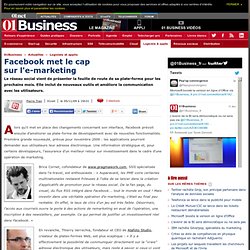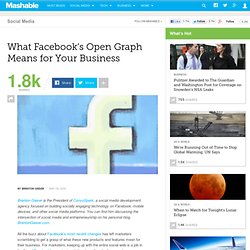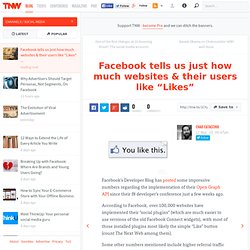

Facebook met le cap sur l'e-marketing. 01net le 05/11/09 à 15h31 Alors qu'il met en place des changements concernant son interface, Facebook prévoit ensuite d'améliorer sa plate-forme de développement avec de nouvelles fonctionnalités.

Première grande nouveauté, prévue pour novembre 2009 : les applications pourront demander aux utilisateurs leur adresse électronique. Une information stratégique et, pour certains développeurs, l'assurance d'un meilleur retour sur investissement dans le cadre d'une opération de marketing. Brice Cornet, cofondateur de www.pragmawork.com, SSII spécialisée dans l'e-travel, est enthousiaste : « Auparavant, les PME voire certaines multinationales restaient frileuses à l'idée de se lancer dans la création d'applicatifs de promotion pour le réseau social.
Deuxième nouveauté, prévue pour décembre 2009, le système de notification actuel, utilisé notamment par les applications pour alerter les utilisateurs, va disparaître. Une nouvelle viralité Vers une meilleure gestion de l'identité numérique.
5 Ways Facebook Will Impact E-commerce. Mitchell Harper is co-founder of BigCommerce, a leading provider of shopping cart software used by more than 40,000 organizations worldwide. Mitchell has written and published over 300 articles relating to software development, marketing, business, social media and entrepreneurship. After watching Mark Zuckerberg's recent keynote at the Facebook F8 developers conference, it is clear that Facebook is looking to become the standard in social personalization for everything you do online. And the new social features and direction that they announced will undoubtedly have an impact on the broader world of e-commerce. For example, their new "Like" button is already visible on over 50,000 websites, and they're providing an API-based way to access what they're calling a user's "Open Graph," which is a list of everything he or she has "liked" across the entire web — music, books, restaurants, food and more.
The Facebook Standard What This Means for E-commerce 1. What Facebook’s Open Graph Means for Your Business. Brenton Gieser is the President of ConvoSpark, a social media development agency focused on building socially engaging technology on Facebook, mobile devices, and other social media platforms.

You can find him discussing the intersection of social media and entrepreneurship on his personal blog, BrentonGieser.com. All the buzz about Facebook’s most recent changes has left marketers scrambling to get a grasp of what these new products and features mean for their business. For marketers, keeping up with the entire social web is a job in itself, and Facebook’s constant evolution doesn’t make it any easier. To sum up the recent announcements, it is appropriate to simply state that Facebook has moved one step closer to creating the semantic web — that is, a human-powered web — and positioning itself at the center of this new universe.
Facebook’s Open Graph protocol will help cultivate richer and more useful data in an attempt to make “social” the new default of the web. Facebook tells us just how much websites & their users like “Lik. Facebook’s Developer Blog has posted some impressive numbers regarding the implementation of their Open Graph API since their f8 developer’s conference just a few weeks ago.

According to Facebook, over 100,000 websites have implemented their “social plugins” (which are much easier to use versions of the old Facebook Connect widgets), with most of those installed plugins most likely the simple “Like” button (count The Next Web among them). Some other numbers mentioned include higher referral traffic from Facebook.com, including a 290% spike for The Washington Post, and 250% for ABC News. Also, IMDB users have produced over 350,000 Likes. Want to test just how popular Facebook’s new plugins are? Go and visit your five favorite blogs, check and see if a single one has not installed the new plugins. Facebook is becoming a hub that collects information and activity from external websites, and then sends users to where that data originally came from.